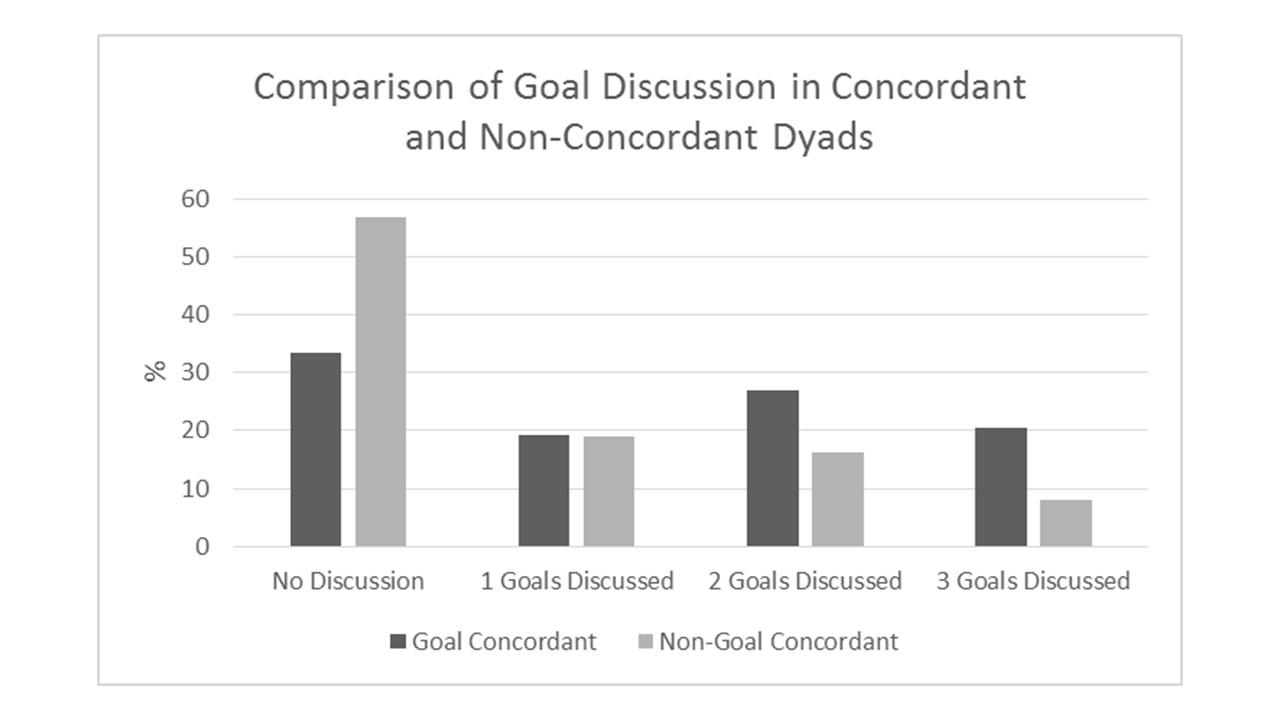Session Information
Date: Monday, November 13, 2023
Title: (1200–1220) Patient Outcomes, Preferences, & Attitudes Poster II
Session Type: Poster Session B
Session Time: 9:00AM-11:00AM
Background/Purpose: Goal concordance between patients with chronic disease and their clinicians is linked to improved outcomes, however, less is known about goal concordance and goal communication in rheumatoid arthritis (RA). Our objective was to explore the relationship between goal concordance and actual conversation of patient goals during the clinic visit.
Methods: Patients with RA seen at one of two rheumatology clinics were enrolled in a cross-sectional survey study. Prior to the visit, enrolled patients and their clinicians independently ranked their top 3 goals for RA treatment. After the visit, patients completed a survey question that asked if any of their goals were discussed during the visit. Concordance was defined as the patient’s #1 goal being among any of the top 3 listed by the clinician. Additional survey items included a measure of health literacy, demographics, and self-reported adherence. Goal concordance and number of goals discussed were analyzed using both descriptive statistics and statistical analysis using a Chi2 test, in which we compared rates of communication between concordant and non-concordant patient-clinician dyads.
Results: 178 patient-clinician dyads included 15 clinicians. Of the 178 patients, 58% were female, 16% Spanish speaking, and 29% with limited health literacy. The majority of dyads (79%) were goal concordant. Among goal-concordant dyads, 33% did not discuss any goals during the visit, while 19% discussed 1 goal, 27% discussed 2 goals, and 21% discussed 3 goals. In contrast, 57% of non-goal concordant dyads did not discuss any goals during the visit, compared with 19% who discussed one goal, 16% discussed 2 goals, and 8% discussed 3 goals. Goal concordant dyads were more likely to discuss at least one goal during the visit (OR 2.63, p-value 0.009).
Conclusion: Goal concordant dyads were more likely to discuss RA patient goals during the clinic visit compared with discordant dyads. Tools to elicit RA patient goals prior to a clinic visit that can be incorporated into real-time discussions with clinicians have potential to improve patient engagement in care and RA outcomes.
To cite this abstract in AMA style:
Barton J, ZuZero D, Molina Ochoa D, Matsumoto R, Yelin E. Goal Concordant Patient-clinician Dyads Have Higher Odds of Communication Around Rheumatoid Arthritis Goals [abstract]. Arthritis Rheumatol. 2023; 75 (suppl 9). https://acrabstracts.org/abstract/goal-concordant-patient-clinician-dyads-have-higher-odds-of-communication-around-rheumatoid-arthritis-goals/. Accessed .« Back to ACR Convergence 2023
ACR Meeting Abstracts - https://acrabstracts.org/abstract/goal-concordant-patient-clinician-dyads-have-higher-odds-of-communication-around-rheumatoid-arthritis-goals/

